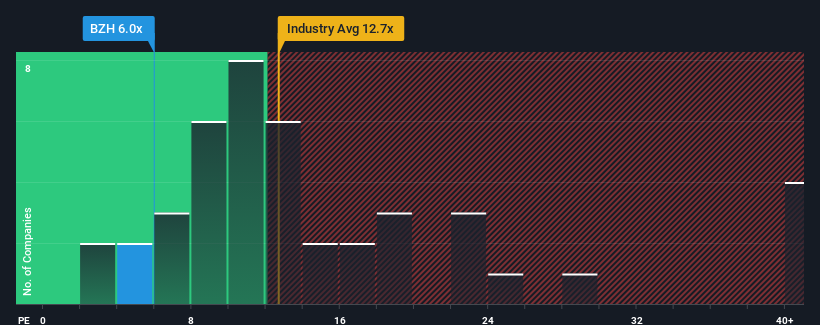- United States
- /
- Consumer Durables
- /
- NYSE:BZH
Improved Earnings Required Before Beazer Homes USA, Inc. (NYSE:BZH) Shares Find Their Feet
Beazer Homes USA, Inc.'s (NYSE:BZH) price-to-earnings (or "P/E") ratio of 6x might make it look like a strong buy right now compared to the market in the United States, where around half of the companies have P/E ratios above 18x and even P/E's above 33x are quite common. Although, it's not wise to just take the P/E at face value as there may be an explanation why it's so limited.
With earnings that are retreating more than the market's of late, Beazer Homes USA has been very sluggish. The P/E is probably low because investors think this poor earnings performance isn't going to improve at all. If you still like the company, you'd want its earnings trajectory to turn around before making any decisions. If not, then existing shareholders will probably struggle to get excited about the future direction of the share price.
View our latest analysis for Beazer Homes USA

Does Growth Match The Low P/E?
In order to justify its P/E ratio, Beazer Homes USA would need to produce anemic growth that's substantially trailing the market.
If we review the last year of earnings, dishearteningly the company's profits fell to the tune of 26%. However, a few very strong years before that means that it was still able to grow EPS by an impressive 144% in total over the last three years. So we can start by confirming that the company has generally done a very good job of growing earnings over that time, even though it had some hiccups along the way.
Turning to the outlook, the next year should bring diminished returns, with earnings decreasing 4.2% as estimated by the three analysts watching the company. That's not great when the rest of the market is expected to grow by 11%.
With this information, we are not surprised that Beazer Homes USA is trading at a P/E lower than the market. However, shrinking earnings are unlikely to lead to a stable P/E over the longer term. Even just maintaining these prices could be difficult to achieve as the weak outlook is weighing down the shares.
The Key Takeaway
It's argued the price-to-earnings ratio is an inferior measure of value within certain industries, but it can be a powerful business sentiment indicator.
We've established that Beazer Homes USA maintains its low P/E on the weakness of its forecast for sliding earnings, as expected. At this stage investors feel the potential for an improvement in earnings isn't great enough to justify a higher P/E ratio. It's hard to see the share price rising strongly in the near future under these circumstances.
Plus, you should also learn about this 1 warning sign we've spotted with Beazer Homes USA.
You might be able to find a better investment than Beazer Homes USA. If you want a selection of possible candidates, check out this free list of interesting companies that trade on a low P/E (but have proven they can grow earnings).
Valuation is complex, but we're here to simplify it.
Discover if Beazer Homes USA might be undervalued or overvalued with our detailed analysis, featuring fair value estimates, potential risks, dividends, insider trades, and its financial condition.
Access Free AnalysisHave feedback on this article? Concerned about the content? Get in touch with us directly. Alternatively, email editorial-team (at) simplywallst.com.
This article by Simply Wall St is general in nature. We provide commentary based on historical data and analyst forecasts only using an unbiased methodology and our articles are not intended to be financial advice. It does not constitute a recommendation to buy or sell any stock, and does not take account of your objectives, or your financial situation. We aim to bring you long-term focused analysis driven by fundamental data. Note that our analysis may not factor in the latest price-sensitive company announcements or qualitative material. Simply Wall St has no position in any stocks mentioned.
About NYSE:BZH
Moderate growth potential with mediocre balance sheet.
Similar Companies
Market Insights
Community Narratives




